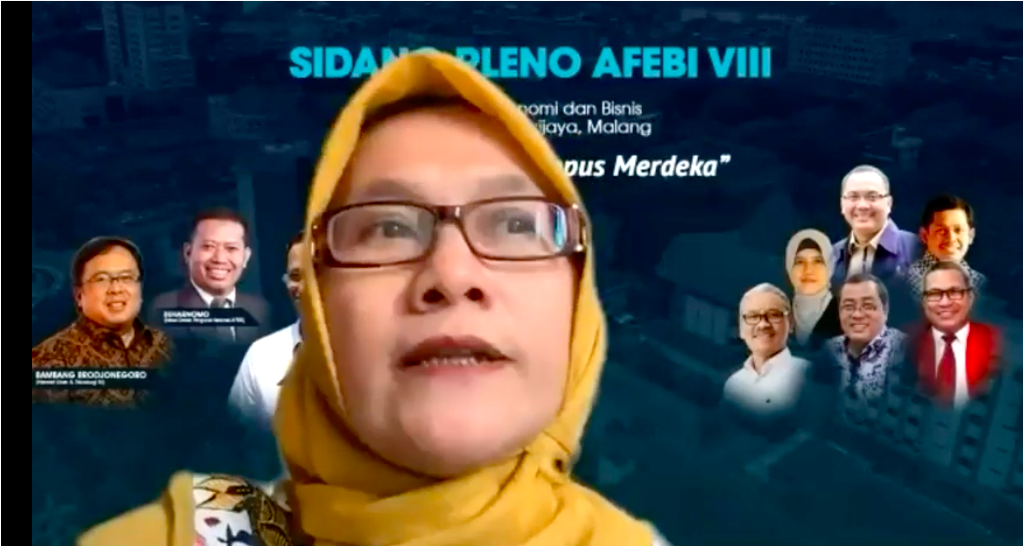FEB UI Attends AFEBI Plenary Meeting on the Implementation of Kampus Merdeka Policy
Delli Asterina ~ FEB UI Public Relations Officer
The Association of Faculty of Economics and Business Indonesia (AFEBI), an association of economics, management, business and accounting education providers, plays an active role and actively participates in various activities to contribute to efforts to realize public welfare through the implementation of the Three Pillars of Higher Education (Tri Dharma Perguruan Tinggi).
Minister of Education and Culture Nadiem Anwar Makarim’s Kampus Merdeka (Independent Campus) policy has an impact on four areas in higher education, namely university autonomy that gives state and private universities freedom to open and establish new study programs; automatic re-accreditation; freedom of state universities as public service entities (BLU) and work units to convert their statues into legal entities; and the opportunity (the right) for students to take courses outside their major and redefinition of the semester credit unit (SKS).
The implementation of these changes will vary from one university to another. To address the issue, AFEBI held an online plenary meeting that took The Implementation of the Kampus Merdeka Policy as its theme. The 8th plenary meeting for 2020 was held at the Faculty of Economics and Business, Universitas Brawijaya, on June 10. During the meeting, AFEB briefed participants about Kampus Merdeka best practises.
Institutional change also took place at the Ministry of Research, Technology and Higher Education, which was transformed into the Ministry of Research and Technology/National Agency for Research and Innovation (Kemenristek/BRIN). With the change, the ministry is expected to focus more on the role of research and innovation by Indonesian researchers and to increase the nation’s competitiveness.
During the meeting, participants also discussed and shared experiences in the implementation of the Kampus Merdeka policy at the faculties of economics and business in Indonesia and the direction of innovation in economic and business research.
Minister of Research and Technology/National Agency for Research and Innovation Prof. Bambang PS Brodjonegoro said that the education sector is growing with a tele-education system that expands the space and time for learning due to reduced opportunities for face-to-face meetings. Among the things that can be done are: Implementing the COVID-19 protocol in educational institutions such as socially distanced seating arrangements and reducing class capacity; optimizing the use of online platforms in educational activities, such as teaching and learning activities, guidance, assignments and exams. For remote, outer and disadvantaged areas with inadequate Internet access, learning activities can be carried out by reactivating television as a means for delivering information and education.
He also explained the 10 technology trends during the pandemic, namely online shopping, digital payment, teleworking (WFH), telemedicine, tele-education and training, online entertainment, supply chain 4.0, 3D printing, robots and drones, 5T Technology and ICT *.
Dr. Beta Yulianita Gitaharie, acting dean of FEB UI, which is part of the Kampus Merdeka pilot project, gave a presentation on the first day of the meeting. Vice Dean I Teguh Dartanto, PhD., gave a presentation on the second day.
Beta said, “The implementation of the Kampus Merdeka policy at FEB UI is carried out with adjustments to the curriculum. In 2020, FEB UI will revise the undergraduate curriculum by setting the minimum study outcome for core courses at 90-95 credit units and for electives at 49-54 credit units. Core courses can be taken in or outside the study program as long as they are comparable to the study program and are recognized by the study program through credit transfer. Electives are options outside the Kampus Merdeka learning activity as long as they are recognized and can be converted into credits and/or are transferable,” said Beta.
“Apart from academic advisors, mentors, evaluators and verifiers are also needed to facilitate conversion and/or credit transfers at the faculty level. Compulsory courses and electives can be taken through blended learning, namely a maximum of 10 massive open online courses (MOOC) plus a minium of six face-to-face courses via live streaming,” she said.
Meanwhile, Teguh Dartanto explained the development of the Kampus Merdeka curriculum in the field of development economics. “The implementation of the Kampus Merdeka curriculum and the competencies of economics (development) students cover at least the key competencies: 25% for macroeconomics, micro & quantitative economics (statistics, mathematics and econometrics), subjects that encourage competence: oral, written and visual, accommodation of the development of issues in the digital world: digital literacy; and final work: various forms of thesis, final works, internship reports and mini-thesis. In addition, each study program is given freedom to develop a curriculum that best represents their characteristics,” said Teguh. (hjtp)
(lem)



